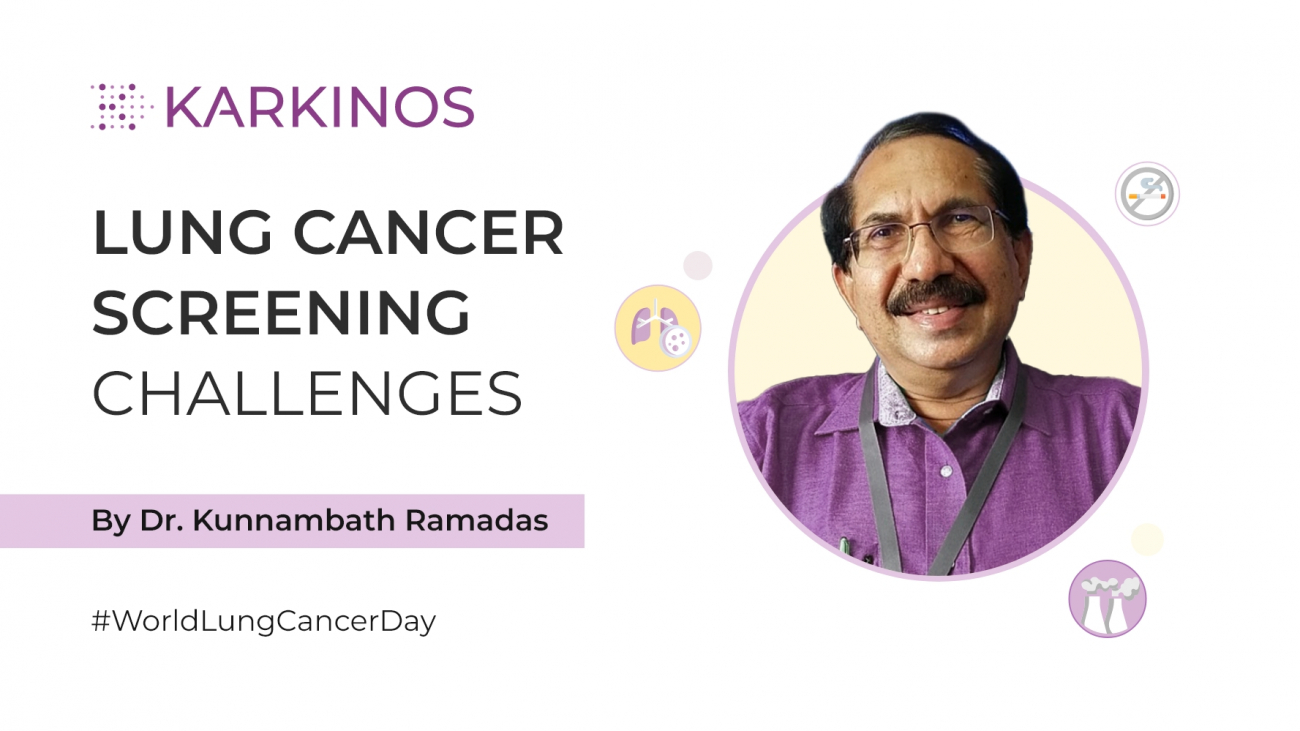Why a low-dose computed tomography (LDCT) is not always feasible in lung cancer early detection?
By Dr. Kunnambath Ramadas, Director – Clinical Operations and Allied services, Karkinos Healthcare
In India, the incidence of lung cancer is certainly very high among the male population, making it the leading cause of cancer associated deaths in the country. In recent times, Indian cancer registries have noticed an upward trend in the incidence rate of lung cancer among the female population too. While in men the use of tobacco products is the major risk factor, in women, passive smoking, exposure to indoor and outdoor air pollution, and occupational hazards are known to be the most common causes of lung cancer. With a human and economic burden in a resource-scarce country like ours, lung cancer becomes an urgent public health crisis that needs to be resolved, particularly by preventing exposure to the known risk factors.
Annually, India reports about 68,000 lung cancer cases and around 65,000 affected cases face death. The mortality rate is extremely high for lung cancers when compared to other common cancers.
On this World Lung Cancer Day, August 1st, 2022, it is important for the stakeholders of the Indian healthcare industry to revisit the interventions in screening for lung cancer to bring about early detection and screening to reduce the increasing mortality.
Challenges in lung cancer screening
The first step in lung cancer prevention is to identify high-risk individuals such as heavy smokers or those constantly exposed to hazardous carcinogens. Tobacco cessation could be the first step to address the condition, while it is also important to improve survival in the high-risk population by early detection through lung cancer screening. Chest X-ray (CXR) with and without sputum cytology as a screening strategy, over the years, have proved to be a failure or to have any significant impact on lung cancer mortality.
Lung cancers are mostly presented to the physician only at late stages (Stage III or IV), where the cancer has metastasized to the entire organ, leaving only palliative care as an option.
Studies from across the world indicate that Low Dose Computed Tomography (LDCT) has shown to improve survival and reduce deaths and is now a standard tool for lung cancer screening. Unlike breast or cervical cancer, large scale screening for lung cancer using LDCT cannot be organized. Several challenges exist in LDCT implementation. LDCT is cumbersome and is not an affordable screening option for the majority of the population in India. Also, exposure to radiation can bring about unforeseen health problems, which could further exacerbate the health condition of the individual.
Added to these, lack of medical infrastructure and trained human resources pose constraints. Other commoner lung diseases like obstructive pulmonary disorders, pulmonary tuberculosis and other chest infections impede accurate lung cancer diagnosis as they may have similar looking images. Since the burden of these diseases is very high in India, the fear is over-diagnosis of the condition while exposing the individual to LDCT.
Since the burden of other lung diseases is very high in India, the fear is over-diagnosis of the condition while exposing the individual to LDCT.
Improving lung cancer screening with the aid of technology
Assessment of high-risk cases for lung cancer is difficult as there are several causative risk factors. Community-based screenings, often, do not identify potential lung cancer susceptible cases.
The best way to initiate any early detection initiative is to act on warning signals presented by the individual. Warning signs could be unexplained weight loss, shortness of breath, persistent cough or blood in sputum. Although lung cancer screening traditionally targets only high-risk populations, Karkinos Healthcare’s digital screening programs have been designed to address the issues that mar the early diagnosis of lung cancers.
Karkinos Healthcare’s Know Your Risk Application provides an easy way to assess one’s risk of lung cancer. The digital risk assessment test is a risk factor-based questionnaire circulated to individuals who need to answer a set of questions that collates information on one’s health and lifestyle habits. Based on the responses, high risk individuals like heavy smokers are identified. Such individuals are aptly guided through Karkinos’ KareMitra team and Karkinos’ proprietary Command Center that enables a distributed cancer care approach helps the individual navigate through the care pathway.
Hence, the way forward is to focus on primary prevention and early clinical diagnosis. Tobacco control and smoking cessation remain the most important long-term intervention to decrease morbidity and mortality from lung cancer in India.
